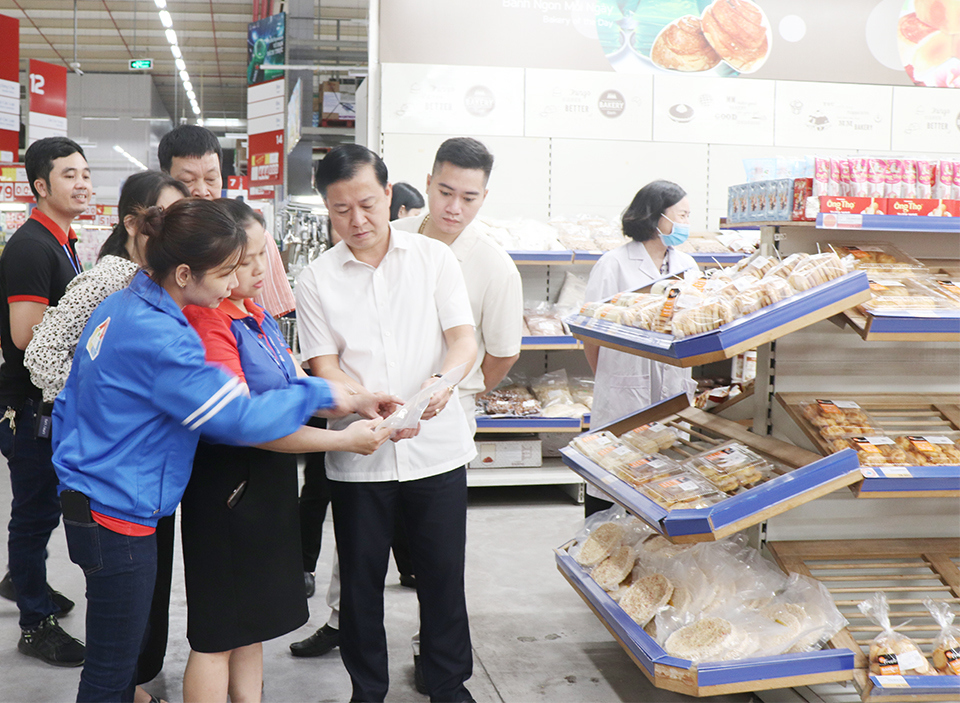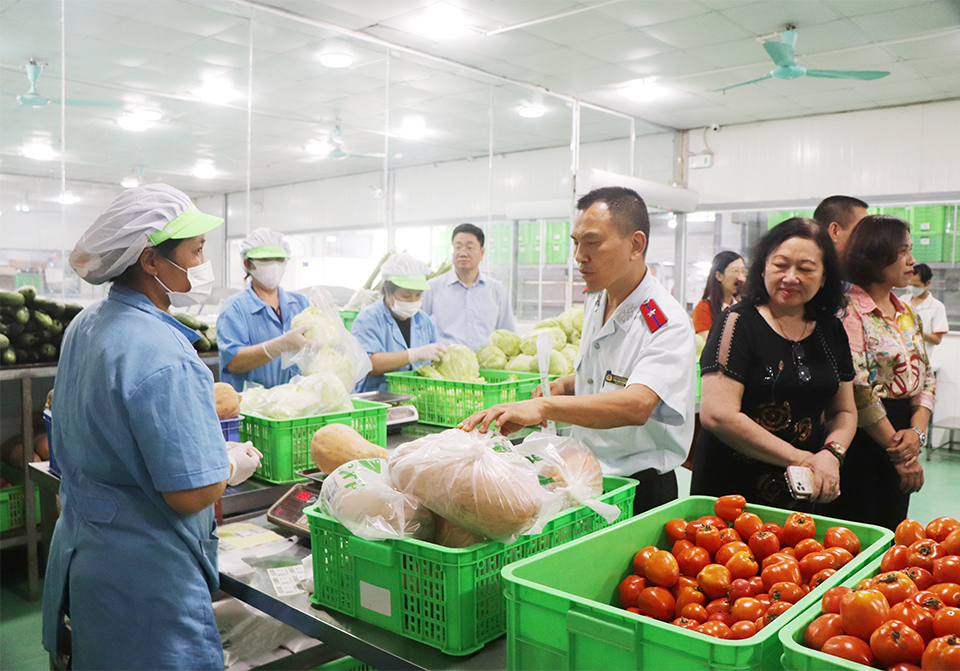Hanoi gears up for Tet: ensuring a steady supply of safe food
The city will work closely with other cities and provinces to ensure that consumers in the capital have access to safe food and agricultural products.
As the year-end approaches, the supply of livestock, poultry, seafood, and vegetables in Hanoi remains relatively abundant.
However, better coordination with provinces and cities is needed to improve information sharing on production conditions and food quality management, said Le Thanh Hoa, Deputy Director of the Department of Quality, Processing and Market Development under the Ministry of Agriculture and Rural Development.
| The inter-sectoral food safety inspection team checks crispy rice products at a supermarket in Hanoi. Photos: Ha Linh/The Hanoi Times |
He pointed out the need for increased training on regulations to ensure food quality and safety, and to manage the import and export of food products.
The Capital is implementing coordinated solutions to develop production according to the annual plan, said Nguyen Dinh Hoa, Deputy Director of the Hanoi Department of Agriculture and Rural Development.
Other tasks include preventing animal diseases, and ensuring stable supplies of essential goods for local residents to secure availability for the end of the year and the upcoming Lunar New Year (Tet), he said.
With just over two months to go until Tet, the demand for safe foods from Hanoi's population of around 10 million, as well as millions of domestic and international visitors, will increase significantly, he added.
"We will work closely with other provinces and cities to ensure the supplies of agricultural products and safe foods for consumers in the Capital," he said.
The department will continue to collaborate with the city's Department of Industry and Trade to monitor supply and demand dynamics, prices, and market conditions in Hanoi so that it can respond to market fluctuations in a timely manner, Hoa added.
The two departments will enhance oversight and traceability of agricultural, forestry, and fishery products from other provinces, focusing on high-demand items and those with significant risks during peak periods, he said.
Agricultural supply chains strengthen food stability in Hanoi
Supply chains for agricultural products from various provinces to Hanoi bring together businesses, cooperatives and farmers, contributing to stable production, Hoa said.
These supply chains ensure that safe agricultural products meet quality management processes and food safety standards, and are distributed through institutional kitchens, supermarkets and convenience stores, he added.
To date, the department has worked with 43 provinces and cities nationwide to establish and develop some 980 agricultural supply chains involving 1,130 participants.
The northern province of Hoa Binh supplies over 1,600 tons of fish from the Da River and over 18,000 tons of fruit annually. The northern province of Son La contributes over 19,000 tons of vegetables and fruits each year, while WinEco Tam Dao in the northern province of Vinh Phuc provides over 2,000 tons of vegetables to Hanoi.
In the northern province of Ha Nam, Masan's branch supplies the capital with more than 1,000 tons of pork and over 700 tons of sausages annually. In addition, the central highlands province of Lam Dong contributes 7-10% of Hanoi's vegetable supplies, totaling over 66,000 tons per year, while its neighbor Dak Lak Province provides over 3,000 tons of fruit.
| Local authorities inspect safe vegetables in Thanh Tri District. |
VietGAP-certified safe vegetables are among the 123 agricultural products from the northern province that have the potential to enter Hanoi-based supermarkets, said Tran Tu Anh, Deputy Director of the Phu Tho Department of Agriculture and Rural Development.
To expand the market for Tien Giang fruits, the cooperative has opened a branch in Hanoi to offer local specialties to consumers in the city, said Nguyen Nam Phong, director of the Vinh Kim Cooperative in the southern province of Tien Giang.
Each year, the cooperative sells about 50-60 tons of fruits in Hanoi through supermarkets, convenience stores, and agricultural processing enterprises, he added.
Challenges remain in secure agricultural supply chains to Hanoi
Currently, reliable agricultural supply chains from other localities to Hanoi face challenges due to the fragmented nature of agricultural production in many regions, according to the Hanoi Department of Agriculture and Rural Development.
In many places, there aren't enough production zones that meet quality standards such as VietGAP, ISO, GlobalGAP, and organic certifications. In addition, the quality of seasonal products remains inconsistent and traceability of these products is still low.
While implementing production linkage models is a sustainable approach, several obstacles remain. Farmers still lack the mindset to link their production to market consumption, and the proportion of agricultural products sold through contracts is low.
It is also difficult for local cooperatives and farmers to get their products into supermarkets and modern retail chains, particularly in terms of stability of quality, pricing, transportation and storage.
Nguyen Nhu Tiep, Director of the Department of Quality, Processing, and Market Development under the Ministry of Agriculture and Rural Development, said that cooperation among provinces in supplying agricultural products to the Hanoi market is crucial for quality management.
In the run-up to the year-end festivities, Hanoi must continue its trade promotion activities to link the production and consumption of agricultural products between the city and other localities, he said.
The ministry will work closely with provinces and cities to regularly sample and analyze the quality of farm products brought into Hanoi, as well as those distributed from the city to other localities, to ensure effective traceability and quality management, he added.
Food market activity intensifies ahead of holiday season As the year draws to a close, Hanoi's food market is bustling in preparation for the holiday and Tet seasons. With the rising demand for various food items, comes an increased risk of food poisoning. Without effective management measures, food safety issues could become increasingly complex, according to the Hanoi Food Safety and Hygiene Department under the Hanoi Department of Health. Since the beginning of 2024, the agency has inspected over 5,800 street food facilities, including those at festivals, fairs, tourist areas, and public spaces. They found that nearly 84% of these establishments meet food safety standards, while over 16% are found to violate the rules. The agency has imposed penalties on the offenders and forced them to take corrective measures to ensure food safety. In addition, over 35,000 food service establishments in the city are inspected, with 85% complying with food safety regulations. Those that have not complied are cautioned and penalized according to regulations, the department reported. |














